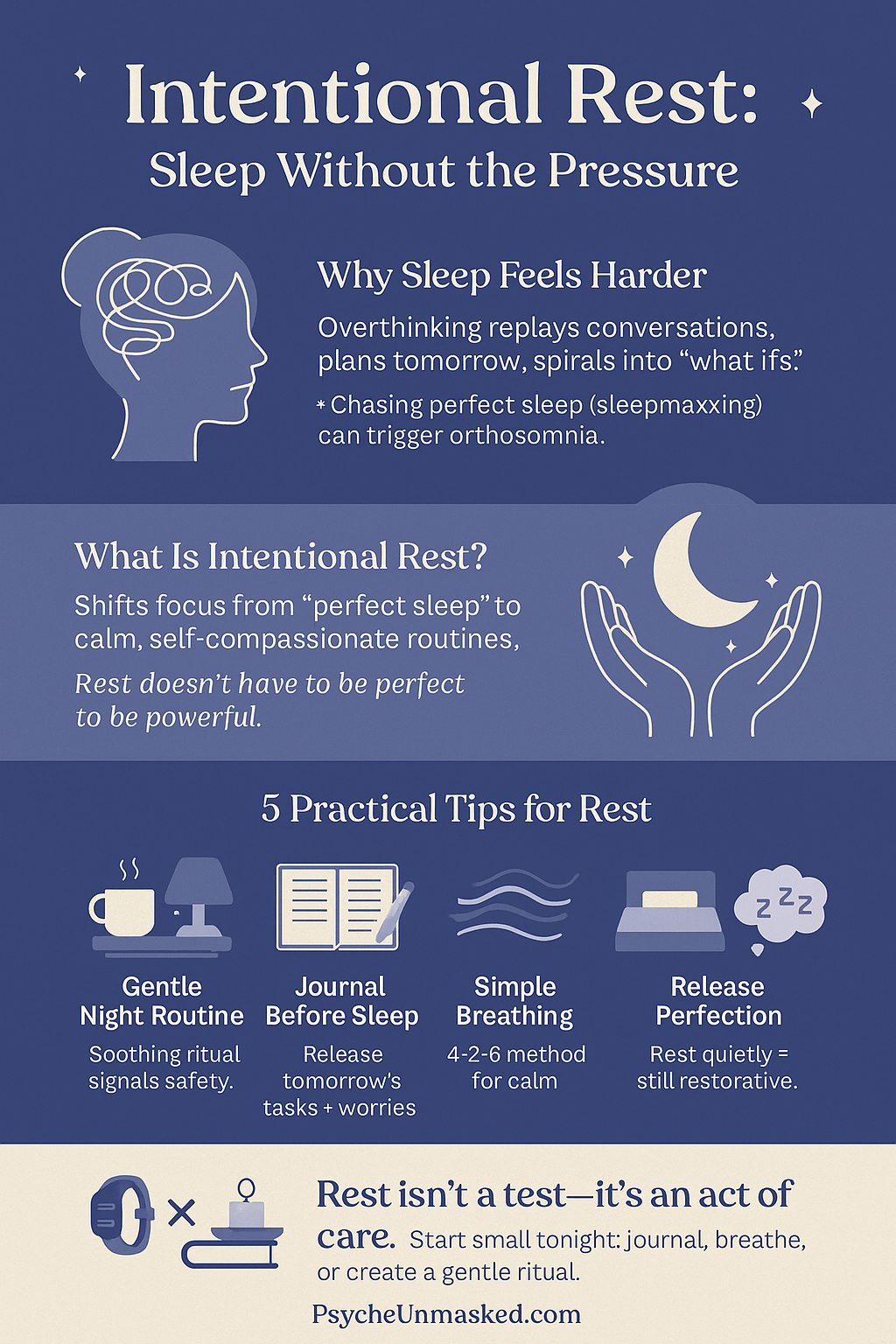Intentional Rest: Sleep Tips for Introverts and Overthinkers Who Can’t Turn Off Their Minds
Why Sleep Feels Harder for Overthinkers and Introverts
If you’re an introvert or an overthinker, you probably know the cycle: you want to sleep, but your brain won’t stop replaying conversations, analyzing tomorrow’s tasks, or spiraling into “what ifs.”
This constant mental chatter is why overthinkers struggle to sleep, and why many introverts feel drained even after lying in bed for hours.
In 2025, a growing trend called sleepmaxxing, where people chase the “perfect sleep” with trackers, supplements, and gadgets has made things worse. Many now suffer from orthosomnia, a form of insomnia triggered by the anxiety of not sleeping well.
The takeaway? Rest doesn’t have to be perfect to be powerful.
What Is Intentional Rest?
Intentional rest is the practice of creating calm, nourishing habits that prepare your body and mind for sleep without the pressure to “hack” it.
For introverts and overthinkers, intentional rest is especially powerful because it shifts the focus away from control and performance toward self-compassion and calm routines.
Think of it as a reset: instead of aiming for flawless sleep scores, you’re giving yourself the gift of peace.
Practical Sleep Tips for Overthinkers and Introverts
These strategies are simple, proven, and designed for people who struggle with racing thoughts at night:
1. Build a Gentle Night Routine
A consistent ritual signals safety to your nervous system. Try:
Dim lighting an hour before bed
Herbal tea (like chamomile)
Quiet reading or soft instrumental music
2. Journal Before Sleep
Overthinking thrives on mental loops. Dump your thoughts onto paper to release them. Write down:
Tomorrow’s tasks (so your brain doesn’t have to hold them)
Worries you’re carrying
Three things you’re grateful for
3. Practice Simple Breathing for Sleep
Skip complex breathwork. Use the 4–2–6 method: inhale for 4, hold for 2, exhale for 6. Repeat until your body relaxes.
4. Redefine Your Sleep Environment
Make your room a sanctuary: soft fabrics, neutral colors, and minimal clutter. If possible, reserve your bed for sleep and rest only—not for work or endless scrolling.
5. Release the Pressure to Sleep Perfectly
If you wake up in the night, don’t panic. Remind yourself: “Resting quietly is still restorative.” Let go of the idea that sleep must be perfect to matter.
Real Example: Letting Go of Sleep Perfection
One introverted reader told us she tracked her sleep obsessively, only to feel worse every morning when the numbers disappointed her. Once she ditched the tracker and built a calming evening ritual—stretching, journaling, and soft lighting—she fell asleep faster.
Her secret wasn’t optimization. It was removing the pressure.
Final Takeaway: Rest Is a Form of Self-Compassion
If you’re an introvert or overthinker, you don’t need another sleep hack—you need kindness. Intentional rest reminds you that sleep isn’t a test. It’s an act of care.
Start small tonight: write down your thoughts, breathe deeply, or create a gentle ritual. Allow yourself to rest imperfectly. Because even imperfect rest heals.
Ready to put these ideas into action? Take the next step toward a calmer, more purposeful life with our 120-day course with daily modules designed to reset stress, spark motivation, and transform your mental health in just four months.

